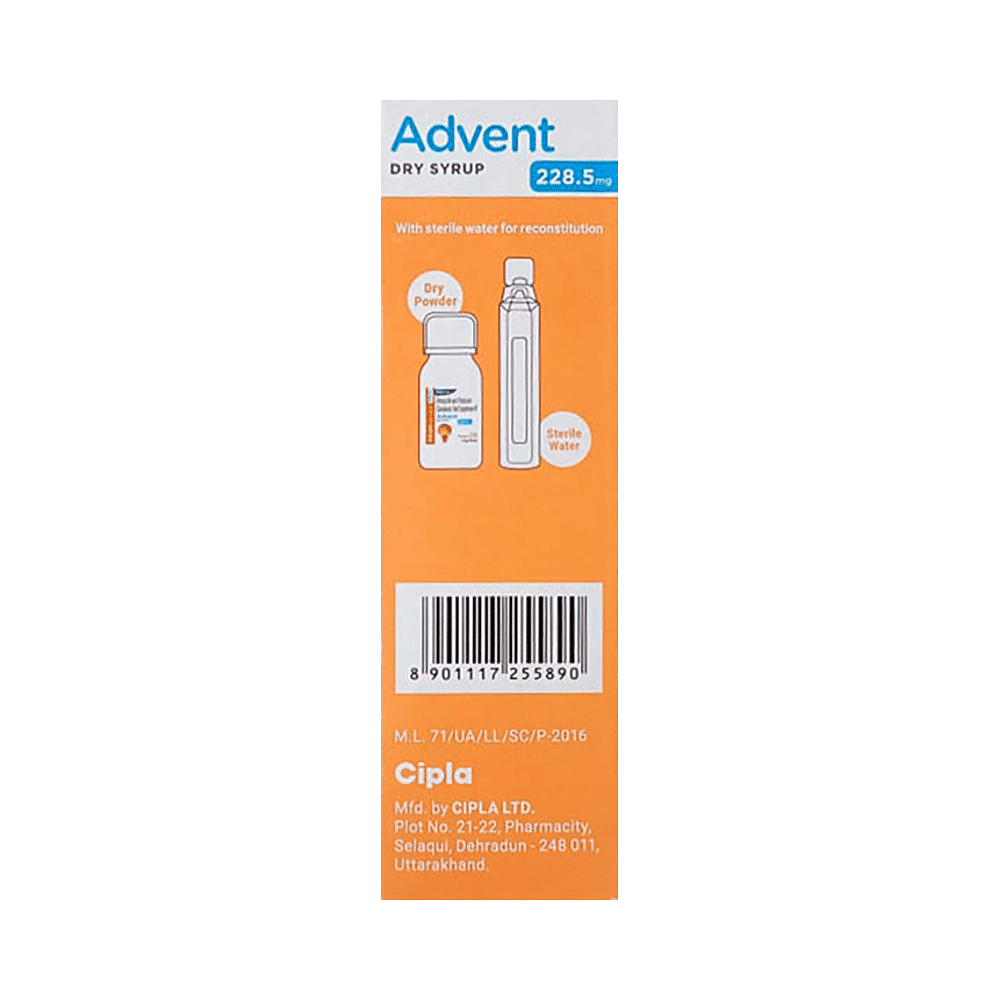
Xyclav Dry Syrup
Manufacturer
Signova Pharma Pvt Ltd
Salt Composition
Amoxycillin (200mg/5ml) + Clavulanic Acid (28.5mg/5ml)
Key Information
Short Description
Xyclav Dry Syrup is an antibiotic medicine that helps treat bacterial infections of the ear, nose, throat, chest, lungs, teeth, skin, and urinary tract.
Dosage Form
Dry Syrup
Introduction
Xyclav Dry Syrup is an antibiotic medicine that helps treat bacterial infections of the ear, nose, throat, chest, lungs, teeth, skin, and urinary tract. It is capable of killing bacteria that have become resistant to other therapies and thus also helps treat tuberculosis that is resistant to other treatments.
Directions for Use
Your child must complete the entire course of antibiotics. Stopping too soon may cause the bacteria to multiply again or cause another infection.
How it works
Xyclav Dry Syrup is an antibiotic. It has two active agents amoxycillin and clavulanic acid. Amoxycillin works by preventing the formation of the bacterial protective covering (cell wall) essential for the survival of the bacteria. Whereas clavulanic acid serves a special purpose of inhibiting an enzyme (beta-lactamase) that is produced by resistant bacteria. This makes the combination of amoxycillin and clavulanic acid an effective line of treatment for many types of infections.
Quick Tips
Your child must complete the entire course of antibiotics. Stopping too soon may cause the bacteria to multiply again or cause another infection. Encourage your child to drink plenty of water in case diarrhea develops as a side effect. Never give Xyclav Dry Syrup until and unless prescribed by the doctor. Do not give Xyclav Dry Syrup to treat common cold and flu-like symptoms caused by viruses. Check ‘expiry’ before giving Xyclav Dry Syrup to your child. Immediately discard all the expired medicines.
Related Medicines

Advent 228.5mg Dry Syrup Tangy Orange

Saumox CV Dry Syrup

Moxpro CV Dry Syrup

Stivmox CV Dry Syrup

Zemoxy-CV Dry Syrup

Insimox CV Dry Syrup

Anclov Dry Syrup

Moxigap CV Dry Syrup

Mordica Dry Syrup

Moxidat CL Dry Syrup
Frequently asked questions
Can other medicines be given at the same time as Xyclav Dry Syrup?
It is essential to consult with your child's doctor before administering any medication, including supplements or over-the-counter drugs, alongside Xyclav Dry Syrup. This will ensure there are no potential interactions that could negatively affect your child's health.
Can I get my child vaccinated while on treatment with Xyclav Dry Syrup?
Generally, antibiotics do not interfere with vaccines or cause significant reactions in children. However, it is crucial to follow your child's doctor's advice regarding vaccination after they are well-recovered from the illness. Once your child feels better, you can proceed with the vaccine. It is always best to consult with your child's healthcare provider before administering any medications and vaccinations.
Which lab tests may my child undergo while taking Xyclav Dry Syrup on a long-term basis?
Periodically, based on the severity of the condition and the duration of treatment with Xyclav Dry Syrup, the doctor may recommend kidney and liver function tests to assess your child's overall health during prolonged therapy. This helps in monitoring their well-being.
Can I give a higher than the recommended dose of Xyclav Dry Syrup to my child?
It is crucial to follow the prescribed dosage instructions for your child's age and condition. Increasing the dosage without consulting with your doctor can lead to adverse effects and might be unnecessary. It's always best to consult with your healthcare provider before making any adjustments.
Can I stop giving Xyclav Dry Syrup to my child when the symptoms are relieved?
No, do not discontinue the medication early without consulting with your doctor. It is crucial to complete the full course as prescribed by the doctor, even if the child experiences symptom relief, to ensure a complete cure and prevent possible recurrence of the infection. The medicine may still be helpful in mitigating complications or preventing future infections.
Can the use of Xyclav Dry Syrup cause diarrhea?
Yes, Xyclav Dry Syrup can sometimes cause diarrhea, as it is an antibiotic that targets harmful bacteria. Additionally, the medication's effect on beneficial bacteria in your child's stomach may contribute to diarrhea. To help mitigate this, encourage your child to drink adequate fluids and stay hydrated. If your child experiences persistent diarrhea or shows signs of dehydration (less frequent urination, dark-colored urine with a strong odor), talk to your doctor immediately.
Do all viral common colds result in secondary bacterial infection?
Most of the time, bacterial infections do not follow viral infections. It is important to note that antibiotics are only prescribed for bacterial infections. Always consult with your child's doctor before administering antibiotics.
The mucus coming out of my child’s nose is yellow-green. Is it a sign of a bacterial infection?
Yellow or green nasal discharge is not necessarily indicative of a bacterial infection, and it is common during a common cold. The condition typically resolves within 7-10 days. However, it's crucial to consult your child's doctor if the symptoms don't improve or worsen for any reason.
Is there any sign which shows that my child needs immediate medical attention?
You must contact your child's doctor immediately if they experience any of the following: severe allergic reactions (difficulty breathing, skin rash), gastrointestinal infections (severe diarrhea), or signs of liver damage such as weakness, paleness, and vomiting. These are serious side effects that require immediate medical attention.


